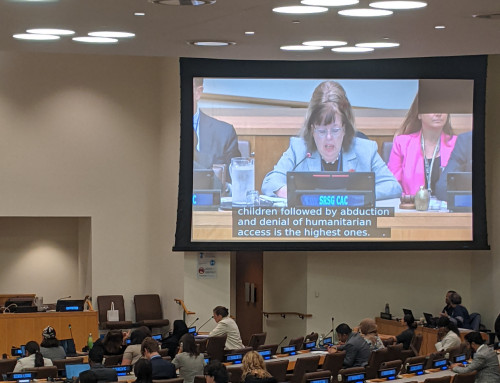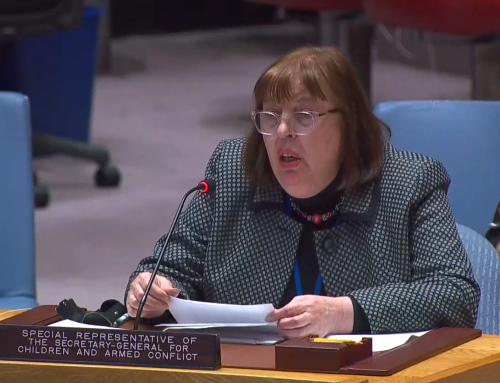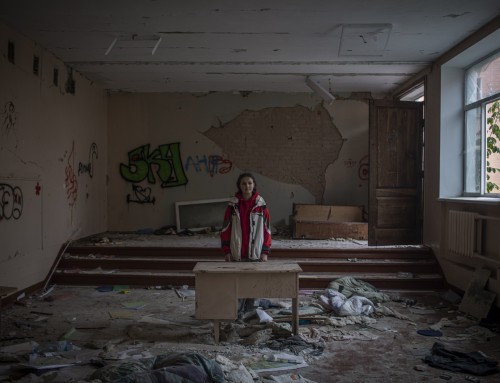Statement to the ECOWAS Heads of State Summit
STATEMENT
on the occasion of the
Twenty-sixth Ordinary Summit of the Authority of
Heads of State and Government of
the Economic Community of West African States
by
Olara A. Otunnu
Under-Secretary-General
Special Representative of the Secretary-General
for Children and Armed Conflict
Friday, 31 January 2003
Dakar, Senegal
Your Excellency the President of the Republic of Senegal and Chairman of ECOWAS, Maître Abdoulaye Wade,
Your Excellencies, Heads of State and Government,
Your Excellency, Executive Secretary, Dr. Mohamed Ibn Chambas,
Excellencies,
Ladies and Gentlemen,
It is very good to be back in Dakar. The energy and warmth of the Senegalese people are always wonderfully invigorating.
I am very honoured to participate in this summit. I am very grateful for the kind invitation and the opportunity to reflect together on our common preoccupation – how to ensure the protection, rights and well-being of children exposed to conflict within the West African sub-region.
As we meet here today, my thoughts go especially to the young people of this sub-region – these young people whose intelligence and dynamism exemplify the pride of African youth. How can we, for example, ever forget the wondrous performance of the Lions of Teranga in the World Cup last year? The Lions made us all feel so proud.
The remarkable ascendancy of Africa in this World Cup last year conveys a larger but simple message – that African youth can perform miracles when given the necessary opportunities, support and access. This is why all resources must be mobilized to ensure a truly serious level of investment in the children and youth of Africa.
And this is also why it is so painful to witness the lives of so many children in Africa being destroyed by wars: children being killed or maimed; children made orphans; children uprooted from their homes and displaced within their countries or across borders as refugees; children being raped and sexually abused; children deprived of education and health care; children exploited as child soldiers; and children left with deep emotional scars and trauma.
At a time when children in other parts of the world are cruising on the information highway, learning to become skilled and competitive citizens of the world of the 21st century, too many of Africa's children are in battlefields learning to kill and be killed. Instead of attending schools and enjoying the comfort and protection of their families, too many of Africa's children are languishing in camps for displaced, often deprived of basic education and health.
Sadly, this picture is all too well known in West Africa, from Liberia to Sierra Leone, to Guinea-Bissau, and now Côte d'Ivoire.
In Liberia, the impact on children of the ongoing conflict remains grave; in particular their continued use as combatants.
I am deeply concerned about the tragic turn of events in Côte d'Ivoire, a country which for so long exemplified peace, prosperity and solidarity in Africa. This has been broken by the drums of war which are now beginning to reach the children. No efforts should be spared to preserve unity and peace in the country, to ensure the protection of children and to prevent their engagement in conflict. In this connection, I wish to express particular appreciation for the energetic efforts being deployed by national and sub-regional leaders to that end.
Recent developments in Sierra Leone represent good news for the sub-region – a testimony to fruit of the partnership and commitment of ECOWAS and the United Nations to end conflict and consolidate peace. Today, Sierra Leone provides an example of key achievements for the protection of war-affected children:
The Lomé Peace Accord was the first such agreement to incorporate the concerns of children as children.
An ambitious programme for the demobilization and reintegration of some 7,000 ex-child combatants has been largely accomplished.
Child protection has been well-integrated into the peacekeeping mission, UNAMSIL, with the presence on staff of child protection advisers and training of peacekeepers in child rights and child protection.
A National Commission for War-Affected Children, the first of its kind, has been established, to give priority to children in resource allocation and policy setting.
A strong Child Protection Network of civil society organizations has developed, with a presence throughout the country.
The Special Court, which has been recently established, will give particular attention to crimes committed against children.
Voice of Children, a radio station run by and for children, has been established -also the first of its kind.
Excellencies, the Security Council has called on regional and sub-regional organizations to develop policies, activities and advocacy for the benefit of war-affected children in their regions. ECOWAS has already made important commitments in this regard. In April 2000, foreign and defence ministers met in Accra and adopted the Accra Declaration and Programme of Action on War-Affected Children. Today, one of Accra's key recommendations has been realized with the establishment of ECOWAS' Child Protection Unit.
These achievements, together with your important contribution to the re-establishment of peace in Sierra Leone, constitute a solid foundation for ECOWAS to make the protection of war-affected children a central aspect of its vocation.
An agenda for action
With this in mind, I should like to propose, for your consideration, an agenda for action for children affected by war, on which the United Nations is ready to work in close collaboration with ECOWAS.
Conflict prevention: Conflicts continue to cast a terrible curse on the African continent, destroying entire societies and making development impossible. Those who pay the highest price in this tragedy are children and women. There is no greater imperative facing Africa today than preventing the occurrence and recurrence of conflicts. I urge ECOWAS leaders to take preventive measures at the political, social and economic levels to address factors which facilitate conflicts within countries and within the sub-region.
Ratification of key instruments: In the past few years, key international instruments for the protection of children affected by conflict have been adopted and have entered into force. The Optional Protocol to the Convention on the Rights of the Child on involvement of children in armed conflict requires state parties to set an age limit of 18 years for compulsory recruitment and direct participation in hostilities, and non-state parties are required not to recruit or use child soldiers below 18 years of age. The Rome Statute creating the International Criminal Court classifies recruitment or use in hostilities of children under 15, intentional attacks on schools and hospitals and grave acts of sexual violence as crimes of war. The African Charter on the Rights and Welfare of the Child prohibits the recruitment or direct participation in hostilities of children under the age of 18. I call upon all ECOWAS Member-States that have not yet done so to become parties to these important international instruments.
Embarking on an “era of application”: We now have in place a very impressive body of norms and standards for the protection of war-affected children. The most pressing challenge facing us collectively is how to translate the principles, standards and measures that have been put in place into facts on the ground, into a protective regime that can save children in danger. For this it is imperative to embark on an era of application. ECOWAS can set an example by developing initiatives for monitoring the conduct of parties in conflict relative to their treatment of children.
Integration of child protection in ECOWAS peacemaking and peacekeeping: It is very important to incorporate the concerns of children into all peacemaking and peacekeeping activities of ECOWAS, particularly peace accords, mandates and training.
Civil society network for protection and advocacy: The development and strengthening of the capacity of local actors, especially civil society networks, for advocacy, protection and monitoring is essential – this is the best way to ensure local ownership and sustainability for these endeavours.
Making ECOWAS a child soldier-free zone: In a major development, the UN Secretary-General has recently submitted a report to the Security Council listing parties to conflicts that continue to use or recruit child soldiers. This report breaks new ground. For the first time in an official report to the Security Council, those who violate standards for the protection of war-affected children have been specifically named and listed. The Security Council is sending a message to governments and insurgent groups alike that the international community is watching and that they will be held accountable for the welfare of children in conflict and post-conflict situations. With your concerted and determined action, I am convinced that the ECOWAS region can become a child soldier-free zone.
Post-conflict investment in children: The rehabilitation and the development of children must become a central component of any post-conflict programmes in ECOWAS states, with focus on the key areas of education, basic health care, nutrition, rehabilitation of child combatants and the special needs of girls – investing in our children and youth is the best way to ensure long-term peace.
Strengthening traditional African values and norms: Most African societies have had strong taboos and injunctions concerning the conduct of warfare. A warrior did not attack children, women or the elderly. What has happened to us that this is now being turned on its head in so many situations of conflict in Africa today? We should work closely with community leaders to support and strengthen these traditional values and norms which provide for the protection of children and women in times of war and in the context of post-conflict reconciliation. In Africa, these traditional norms and modern international standards must reinforce each other.
Cross-border initiatives: We should work to promote sub-regional, cross-border initiatives to reduce the recruitment and abduction of children, the displacement of populations and the separation of families, and illicit trade in natural resources which rob children of their birthright. I appeal to Member-States of ECOWAS to redouble their efforts for the implementation of the ECOWAS Moratorium in order to halt the proliferation of small arms and light weapons which fuel wars in the sub-region.
Strengthening of ECOWAS Child Protection Unit: The establishment of the Child Protection Unit in the ECOWAS Secretariat represents a significant innovation and an appropriate response to the call of the UN Security Council. In order for the CPU to fully achieve its mission, it will require strong political and material support from Member-States of ECOWAS and their partners.
Excellencies, I commend these elements of an agenda for action to you for the sake of our children and for the future of Africa. I believe that by far the most important asset for Africa is its enormous human resource and intellectual capital, especially that of its youth. For the most part, this capital remains under-utilized and under-mobilized. A key to Africa's development lies in the strategic tapping, harnessing and creative release of Africa's own incredible talents.
My Office and the entire UN family, particularly UNICEF, UNHCR and the newly established UN Office for West Africa, based here in Dakar, are eager to work closely with you to ensure the protection, rights and well-being of all the children of this sub-region.





